Thomas Duveau Head of Business Development at Mobisol, interviewed by Max Thabiso Edkins, Connect4Climate. Mobisol provides an exciting solar home system solution.
You may be interested in reading this:
Thomas Duveau Head of Business Development at Mobisol, interviewed by Max Thabiso Edkins, Connect4Climate. Mobisol provides an exciting solar home system solution.
You may be interested in reading this:
Amory Lovins Cofounder, Chief Scientist and Chairman Emeritus Rocky Mountain Institute, interviewed by Max Thabiso Edkins, Climate Change Expert, Connect4Climate, World Bank Group.
Some highlights:
The energy transition is going faster than expected. Predictions are already obsolete. We need agile forward-looking institutions to be able to keep up with the energy transition.
SEforALL CEO and Special Representative of the UN Secretary-General for Sustainable Energy for All Rachel Kyte explains Sustainable Energy for All Forum to Connect4Climate.
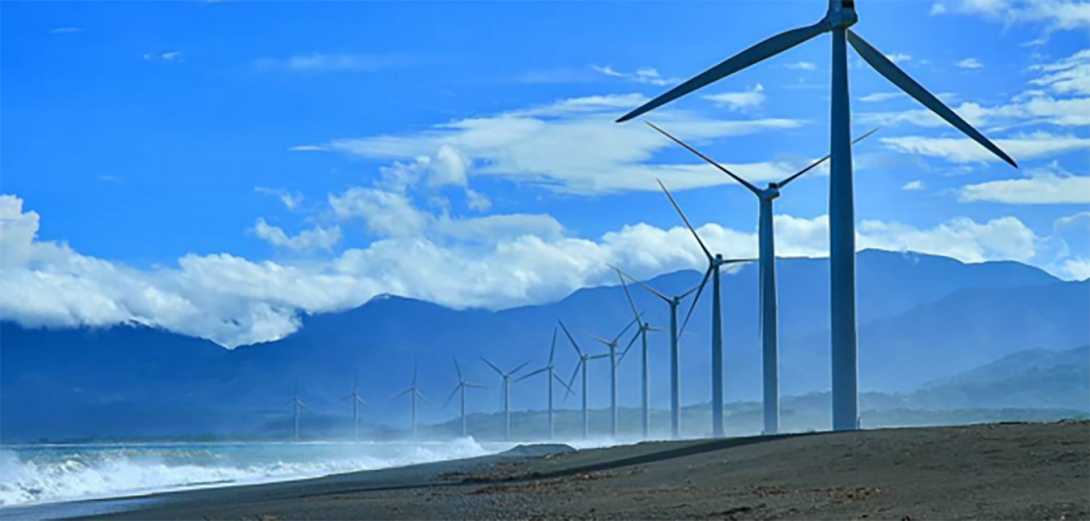
Wind, solar and other renewable energy sources are steadily increasing their share in energy consumption across the European Union, further reducing the need for CO2-emitting fossil fuel energy, according to a report published by the European Environment Agency (EEA) today. This trend is driving down greenhouse gas emissions from electricity generation, buildings’ heating and cooling, and transport.
The EEA report ‘Renewable energy in Europe 2017: recent growth and knock-on effects,’ shows that renewables have become a major contributor to the energy transition occurring in many parts of Europe. Growth in renewables continues to bolster climate change mitigation in the EU. The EU-wide share of renewable energy use increased from 15% in 2013 to 16% in 2014. This upward trend continued also in 2015, as renewable energy accounted for the majority (77%) of new electricity-generating capacity for the eighth year in a row. Recent data from Eurostat showed that the EU-wide renewable energy use finally reached 16.7% in 2015 – which is close to the EEA’s 16.4% preliminary estimate published in December 2016. This steady EU-wide progress in renewables since 2005 enables the EU to stay well on course to reach its target of 20 % by 2020.
At Member State level, the shares of renewable energy use continues to vary widely, ranging from over 30% in Finland, Latvia and Sweden, to 5% or less in Luxembourg and Malta.
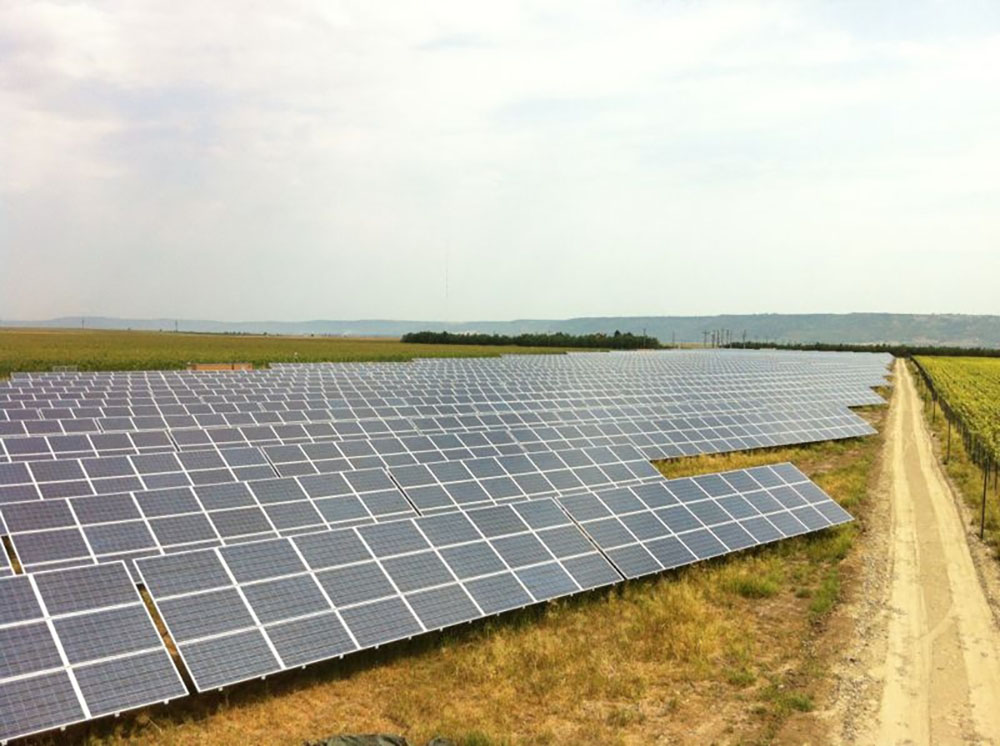
The uptake of renewable energy since 2005 allowed the EU to cut its fossil fuel consumption and greenhouse gas emissions by about a tenth in 2015 – comparable to the annual fossil fuel use and greenhouse gas emissions of Italy. Three quarters of these greenhouse gas reductions attributable to renewables came from the development of renewable electricity production. Coal was the most substituted fuel across Europe, representing about one half of all avoided fossil fuels, followed by natural gas (28% of all avoided fossil fuels). In both 2014 and 2015, the largest reductions in fossil fuel use and CO2 emissions due to the uptake of renewable energy sources took place in Germany, Italy and the United Kingdom.
Global investments in renewables continued to show steady growth over the past decade. This has led to a doubling of global renewable electricity capacity between 2005 and 2015. The EU plays a leading role in developing clean energy technology and is ranked second after China in installed and grid-connected domestic renewable electricity capacity. Still, some non-EU countries are seeing faster progress, something observed also in terms of the share of renewable-energy related jobs in the labour force where in 2015 the EU was overtaken by other countries, such as Japan and China.
The EU and its Member States will need to step-up their climate and energy efforts if they want to meet EU ambitions to become a sustainable, low-carbon economy by 2050, the report says. Key challenges remain, including the formulation of adequate policies that deliver targets, agreeing on an EU monitoring system and improving innovation capabilities to reap the full benefits of the energy transition in Europe.
Source: European Environment Agency
Banner Photo Credits to Allan F. Castañeda

Earth Day Texas (EDTx) is a nonprofit organization that promotes a positive impact on the environment through education, events and curating a public platform for sustainable thought leadership. Founded in 2011 by philanthropist Trammell S. Crow, this three-day free event is held in April to celebrate progress, hope, and innovation and is the largest event in the world of its kind.

On June 4, 2017, New York City will host the inaugural World Ocean Festival. The Festival, organized by The Global Brain Foundation and hosted by the City of New York, is an effort to raise the voices of millions of people and organizations who care deeply about the Ocean and who will stand together for its protection.

On June 4, 2017, New York City will host the inaugural World Ocean Festival. The Festival, organized by The Global Brain Foundation and hosted by the City of New York, is an effort to raise the voices of millions of people and organizations who care deeply about the Ocean and who will stand together for its protection.
- New York City Mayor Bill de Blasio
The World Ocean Festival is a public event on June 4 timed to support The Ocean Conference at UN Headquarters in New York City (June 5-9), where heads of state, ministers, marine experts, civil society and the business community will gather to discuss the rapidly deteriorating health of the world’s ocean and what needs to be done to save it. They will also commemorate World Ocean Day on June 8.
- H.E. Peter Thomson, President of the UN General Assembly
The World Ocean Festival was announced this Tuesday, April 11, at United Nations Headquarters in New York City at a press briefing by Commissioner of the Mayor’s Office for International Affairs Penny Abeywardena, Founder of the World Ocean Festival and The Global Brain Foundation Natalia Vega Berry, and President of the United Nations General Assembly H.E. Peter Thomson.
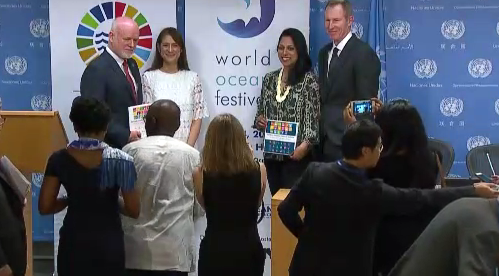
The people of New York City and all over the world will be invited to join the World Ocean Festival activities, which include:
• A public Ocean March in New York City’s waterways in cooperation with the U.S. Coast Guard and the New York Police Department Harbor Unit. Interested participants are invited to register at the World Ocean Festival's website. The Ocean March route will be published along with viewing sites along the route.
• A public Ocean Village celebrating art, education, innovation and tools for action in support of the Ocean. The Village will take place in Gantry State Park in Long Island City, New York overlooking the East River.
The City of New York and The Global Brain are joined by leaders in ocean conservation, advocacy, and sustainable development our Founding Partners Ocean Elders, Mission Blue, and Oceanic, as well Core Supporters including Peace Boat, Connect4Climate, Ocean Collectiv and NGO Committee of Sustainable Development. The event is made possible by support from Founding Sponsor Toyota USA, creator of the Mirai fuel cell vehicle.
New York City has shown a history of leadership in supporting the UN Sustainable Development Goals through its One New York program. Launched on April 22, 2015, “One New York: The Plan for a Just and Strong City” is an innovative blueprint for the City’s future that focuses on four interdependent visions: growth, equity, sustainability, and resiliency.
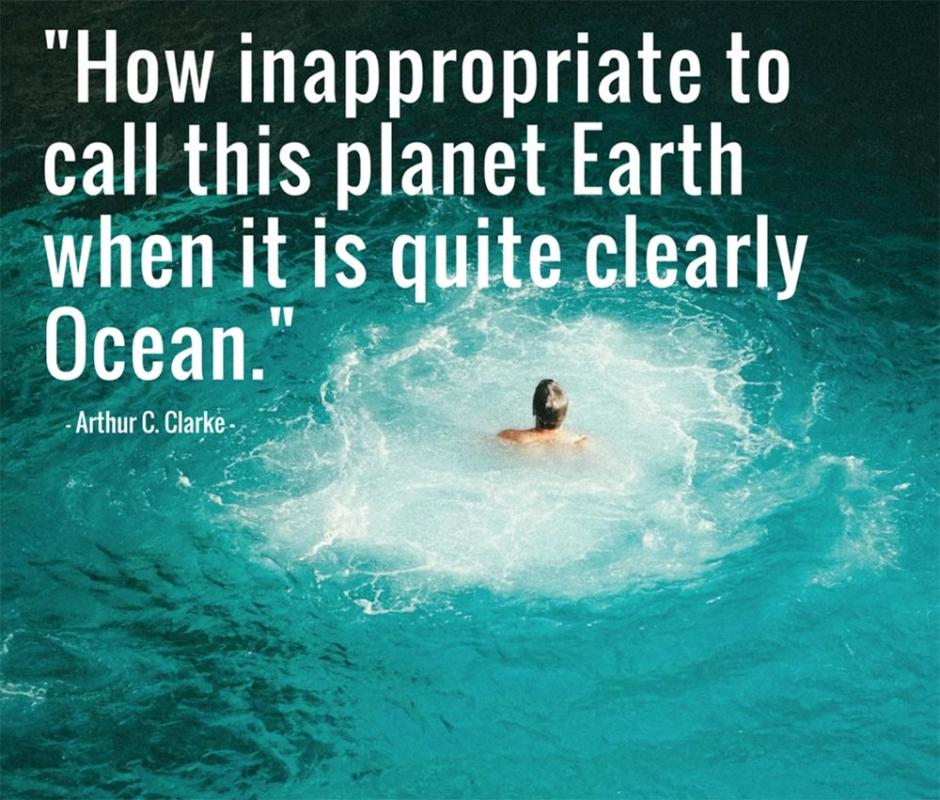
The issues that threaten the Ocean range from illegal fishing threatening species, human sustenance, and economies worldwide; to marine pollution in the form of chemical run-off, spills, and proliferation of plastics filling our Ocean and now entering our food chain; to climate change that is killing our coral reefs, flooding human and animal habitats and feeding a disastrous feedback loop of rising world temperatures.
Nonprofit organizations, foundations, community organizations and others working to promote conservation and sustainable use of the Ocean will be present at the Ocean Village space on June 4 and promoted through a media campaign leading up to the event.

The World Ocean Festival is a public event hosted by the City of New York and organized by The Global Brain Foundation to raise peoples’ voices for the preservation and sustainable use of the Ocean (Sustainable Development Goal 14) in advance of the The Ocean Conference at United Nations Headquarters, which aims to be the game changer that will reverse the decline in the health of our ocean for people, planet and prosperity. For more information about the World Ocean Festival and to register for the Ocean March on June 4, 2017, visit the official website or follow on Twitter @WorldOceanFest, on Instagram @WorldOceanFestival, and on Facebook @WorldOceanFestival.
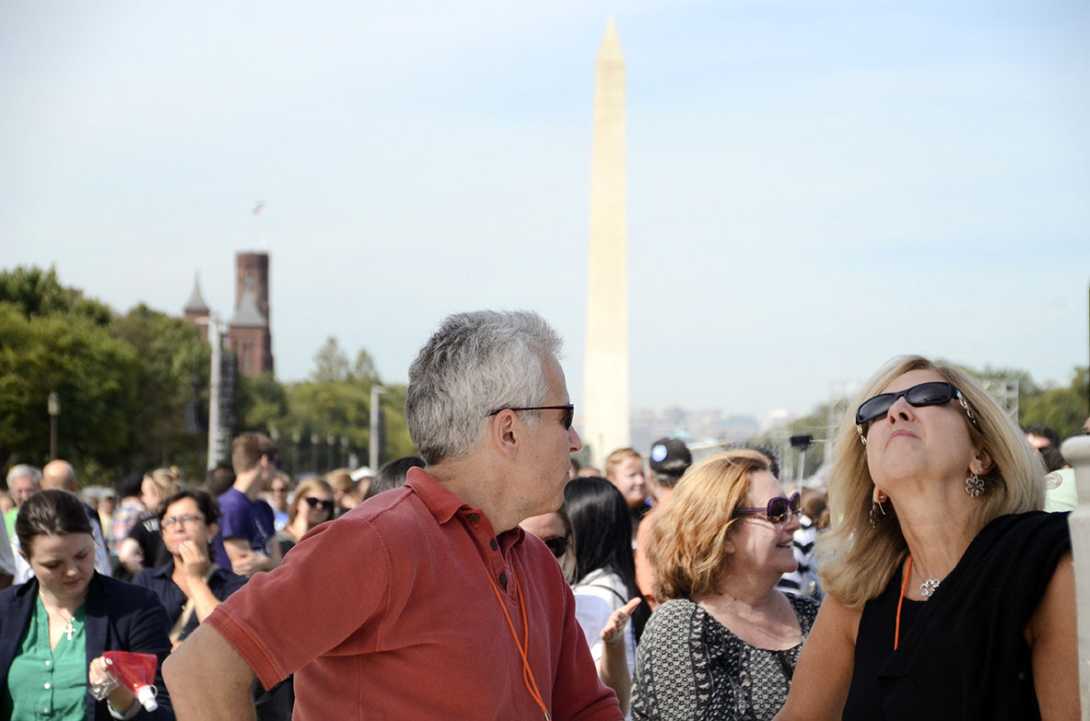
This Earth Day, April 22, Earth Day Network and the March for Science are co-organizing a rally and teach-in on the National Mall in Washington, D.C. The day’s program will include speeches and training with scientists and civic organizers, musical performances, and a march through the streets of Washington, D.C. The crowd will gather at 8:00 am, and the teach-in will begin at 10:00 am.
This Earth Day, join the effort to defend the vital public service role science plays in our communities and our world.
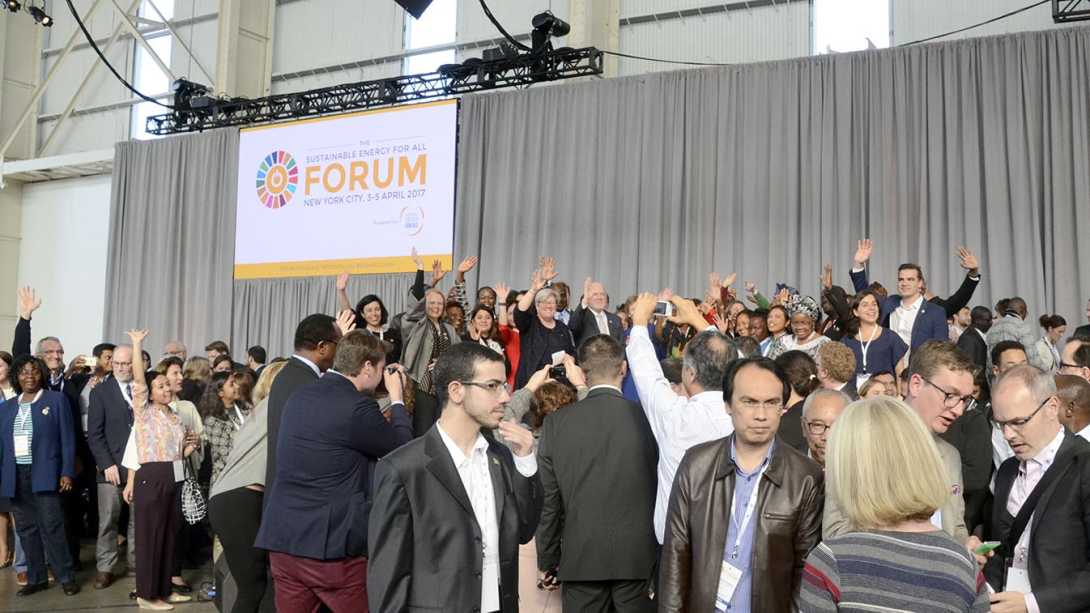
The energy access dividend: Our final day of the 2017 Sustainable Energy for All Forum focused on the energy access dividend, with sessions focusing on exploring the dividends that accrue with energy services and the case for going further, faster – together. From looking at the ‘new market’ and assessing whether the private sector can really service the bottom of the pyramid, to how energy providers are increasing productivity through decentralized solutions, the final day of the Forum addressed core issues in how we ensure an energy transition for all, and as Mary Robinson said in a press conference, “how we reach those furthest behind, first.”
Mary Robinson, President and Chair of the Board of Trustees at the Mary Robinson Foundation – Climate Justice, interviewed by Benjamin Steinlechner, Connect4Climate
During the day, 9 of our speakers lined the Forum circular stage to reveal plans for a new people-centered accelerator to advance gender equality, social inclusion and women’s empowerment in the sustainable energy sector. Through this accelerator, partners will work together to progress action towards these three goals, while working with leaders to promote an energy transition supports these people-centered aims and leaves no one behind. The accelerator is due to formally be launched later in the year.
During her closing speech, Rachel Kyte, Chief Executive Officer of Sustainable Energy for All and Special Representative of the UN Secretary-General for Sustainable Energy for All (SEforALL), said “We built this Forum – and every session in it - on an evidence base: a foundation hewn from the latest Global Tracking Framework, the dashboard that we use to measure progress on Sustainable Development Goal #7. It shows us that there are many extraordinary things happening – and happening all around the world. And those things are happening – in very large part – because of the work you, here at this Forum, are doing. And together, we’ve had the courage to interrogate the latest evidence. Because that’s what real movements do.”
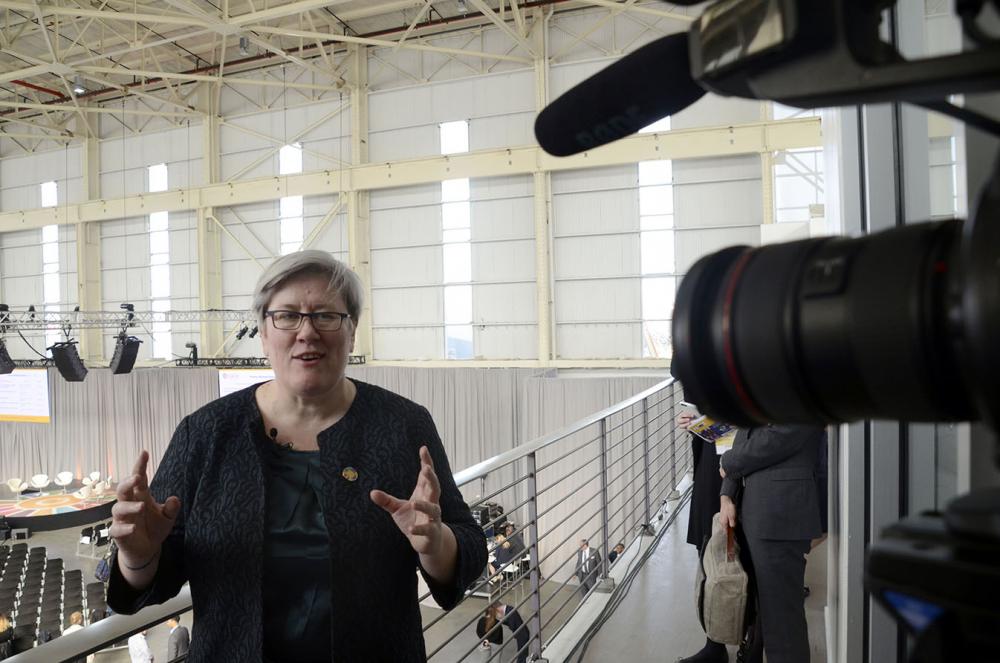
Rachel Kyte talked to Connect4Climate. Photo Credits: Max Thabiso Edkins
ENERGIA presented the Women Entrepreneurship Awards to five inspirational winners from across Africa and Asia in our final afternoon – with successful entrepreneurs, leaders in their communities and role models for other entrepreneurs all being named winners. The awards recognize outstanding work and encourage the winners to perform even better in the future. Each winner will now receive 1,000 euros for the strengthening of their capacities to run an energy business or for enhancing the profitability of their business.
An emerging global campaign on energy access, Shine: Investing in Energy Access for All, was also revealed during the final day of this year’s Forum, focusing on diversifying the sources of finance to support energy access. The campaign will unite partners from the faith, development and philanthropic sectors to commit to mobilizing new forms of capital, scaling resources and generating momentum to achieve universal access to clean, affordable and reliable energy by 2030 and support Sustainable Development Goal 7. It was also confirmed during the day's press conference that the World Council of Churches – which brings together churches, denominations and church fellowships in more than 110 countries and territories throughout the world, representing over 500 million Christians – had committed to join the campaign.
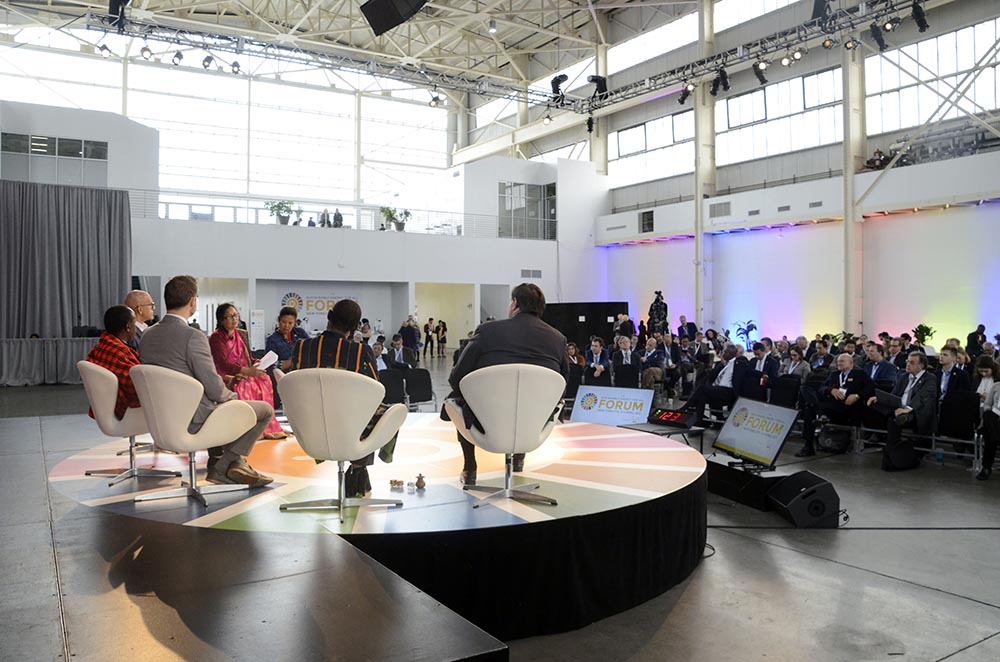
Sustainable Energy for All Forum venue in New York City. Photo Credits: Max Thabiso Edkins/Connect4Climate
The Poor People's Energy Outlook (PPEO) report from Practical Action was launched during the final day, and showed how reforming energy financing can radically hasten energy access. Results showed that poor families in developing countries are being denied access to basic technology and services by financial systems which fail to bring them modern energy.
You may be interested in reading this:
Hosted by the World Bank Group and supported by Italy’s Ministry of the Environment and Energy Security and Germany’s Federal Ministry for Economic Cooperation and Development, Connect4Climate (C4C) is a global partnership for a livable planet that connects, creates, and communicates to build long-lasting change for future generations.